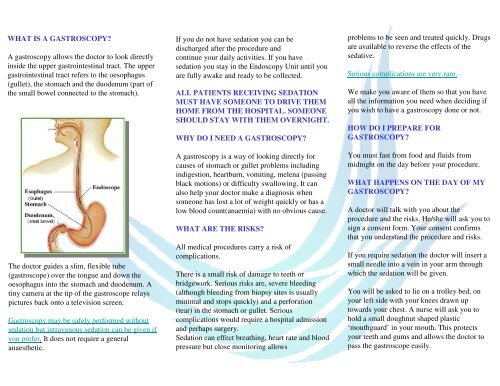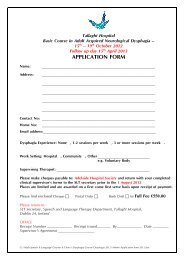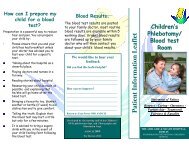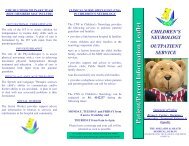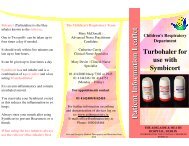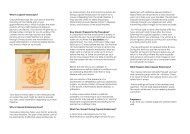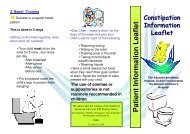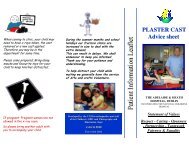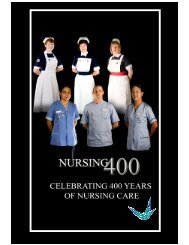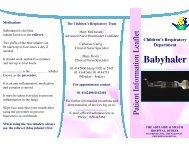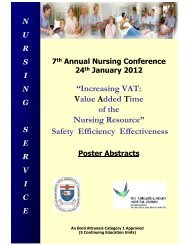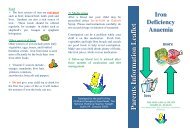What is a gastroscopy?
What is a gastroscopy?
What is a gastroscopy?
You also want an ePaper? Increase the reach of your titles
YUMPU automatically turns print PDFs into web optimized ePapers that Google loves.
WHAT IS A GASTROSCOPY?<br />
A <strong>gastroscopy</strong> allows the doctor to look directly<br />
inside the upper gastrointestinal tract. The upper<br />
gastrointestinal tract refers to the oesophagus<br />
(gullet), the stomach and the duodenum (part of<br />
the small bowel connected to the stomach).<br />
The doctor guides a slim, flexible tube<br />
(gastroscope) over the tongue and down the<br />
oesophagus into the stomach and duodenum. A<br />
tiny camera at the tip of the gastroscope relays<br />
pictures back onto a telev<strong>is</strong>ion screen.<br />
Gastroscopy may be safely performed without<br />
sedation but intravenous sedation can be given if<br />
you prefer. It does not require a general<br />
anaesthetic.<br />
If you do not have sedation you can be<br />
d<strong>is</strong>charged after the procedure and<br />
continue your daily activities. If you have<br />
sedation you stay in the Endoscopy Unit until you<br />
are fully awake and ready to be collected.<br />
ALL PATIENTS RECEIVING SEDATION<br />
MUST HAVE SOMEONE TO DRIVE THEM<br />
HOME FROM THE HOSPITAL. SOMEONE<br />
SHOULD STAY WITH THEM OVERNIGHT.<br />
WHY DO I NEED A GASTROSCOPY?<br />
A <strong>gastroscopy</strong> <strong>is</strong> a way of looking directly for<br />
causes of stomach or gullet problems including<br />
indigestion, heartburn, vomiting, melena (passing<br />
black motions) or difficulty swallowing. It can<br />
also help your doctor make a diagnos<strong>is</strong> when<br />
someone has lost a lot of weight quickly or has a<br />
low blood count(anaemia) with no obvious cause.<br />
WHAT ARE THE RISKS?<br />
All medical procedures carry a r<strong>is</strong>k of<br />
complications.<br />
There <strong>is</strong> a small r<strong>is</strong>k of damage to teeth or<br />
bridgework. Serious r<strong>is</strong>ks are, severe bleeding<br />
(although bleeding from biopsy sites <strong>is</strong> usually<br />
minimal and stops quickly) and a perforation<br />
(tear) in the stomach or gullet. Serious<br />
complications would require a hospital adm<strong>is</strong>sion<br />
and perhaps surgery.<br />
Sedation can effect breathing, heart rate and blood<br />
pressure but close monitoring allows<br />
problems to be seen and treated quickly. Drugs<br />
are available to reverse the effects of the<br />
sedative.<br />
Serious complications are very rare.<br />
We make you aware of them so that you have<br />
all the information you need when deciding if<br />
you w<strong>is</strong>h to have a <strong>gastroscopy</strong> done or not.<br />
HOW DO I PREPARE FOR<br />
GASTROSCOPY?<br />
You must fast from food and fluids from<br />
midnight on the day before your procedure.<br />
WHAT HAPPENS ON THE DAY OF MY<br />
GASTROSCOPY?<br />
A doctor will talk with you about the<br />
procedure and the r<strong>is</strong>ks. He/she will ask you to<br />
sign a consent form. Your consent confirms<br />
that you understand the procedure and r<strong>is</strong>ks.<br />
If you require sedation the doctor will insert a<br />
small needle into a vein in your arm through<br />
which the sedation will be given.<br />
You will be asked to lie on a trolley bed, on<br />
your left side with your knees drawn up<br />
towards your chest. A nurse will ask you to<br />
hold a small doughnut shaped plastic<br />
‘mouthguard’ in your mouth. Th<strong>is</strong> protects<br />
your teeth and gums and allows the doctor to<br />
pass the gastroscope easily.


